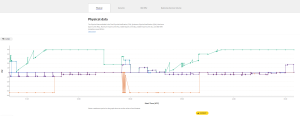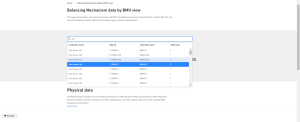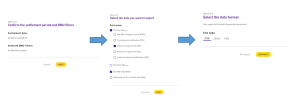BSC Insight: Accessing Maximum Export Limit and Maximum Import Limit data on our Insights Solution
If you currently use the www.bmreports.com service to access Balancing Mechanism (BM) data, you can now access the data through the new Insights Solution. You can use the ‘Balancing Mechanism data by Market View’ page to view BM Unit data at Market level. It can also be used to view Physical, Dynamic, Bid Offer and Balancing Services Volume data.
What is Maximum Export Limit (MEL) and Maximum Import Limit (MIL) data?
Maximum Export Limit (MEL) is a fundamental concept within the GB BM. It is the maximum power export level of a BM Unit (BMU) at a particular time.
Typically Generators use it to represent a time-based profile of the maximum megawatt (MW) volumes that they could be exporting to the Transmission System over a defined period. Maximum Import Limit (MIL) represents a similar profile for BMUs by showing the maximum level volumes in MWs that they could be importing from the Transmission System.
In accordance with the Grid Code, owners of BMUs submit their MIL/MEL data to NGESO from one day ahead of any given Settlement Period. Within 15 minutes after Gate Closure for each Settlement Period, NGESO sends the MIL/MEL data to Elexon. The data is being published on our new Insights Solution, which is part of our cloud platform, Elexon Kinnect.
Our customers typically access MIL/MEL data to gain insights on real time and short-term forecasts of power availability. This plays an essential role in their trading decisions, and it also ensures that their own submissions are reflected on Elexon’s systems. Ofgem, the GB regulator, monitors the data as part of its roles in market surveillance and prevention of market abuse.
Improved user interface
The Insights platform has been designed to improve customer experience in accessing MIL/MEL information.
It has two specific pages:
- Market View: Access to data for all BMUs for a specific Settlement Period
- BMU View: Access to the data for a specific BMU for a Settlement Date
Improved filtering with fuzzy search
If users want to access data for a specific BMU, then they do not need to type in the exact details for it. Instead they can use a fuzzy search which also enhances the filtering. For example, if you are looking for data on Drax Power’s assets, start typing ’Dra’ and the search will bring up assets that fulfil the criteria.
Multi Step Data Downloads
Balancing Mechanism data contains data for all BMUs, which is a lot of information. The site has multi-step download capability so that users can obtain the data that they want to use.
To use this feature, confirm the Settlement Period and BMU filters you want to use, and then select the data you want to see. You can then choose between file types for your download: CSV with headers, JSON or XML.
Flexible RESTful APIs
The Insights platform provides multiple endpoints for programmatic access to MIL/MEL data on the Developer Portal. The Insights APIs are Representational State Transfer (RESTful) APIs which support high-performing and reliable communication at scale with our data.
They use the following patterns:
1: Dataset Endpoints – designed to provide the data as received with minimum filtering:
- /datasets/MILS
- /datasets/MELS
- /datasets/MILS/stream
- /datasets/MELS/stream
2: Opinionated APIs – endpoints with enhanced filtering derived from each dataset designed to help users answer specific questions from the data provided. For example querying MELs for all Drax Power BMUs.
- /physical
- /physical/all
Insights Real Time Information Service (IRIS)
IRIS is the near real-time, free, publicly available push service for accessing Insights Solution data. The IRIS provides an automated push of JSON files as they come in, with minimal latency and automatic outage recovery.
IRIS also shares the same JSON output format with Datasets APIs which enable users to use the API documentation as a reference when using IRIS. This interchangeability allows users to decide which data source works best for them.
IRIS is based on the Advanced Message Queuing Protocol (AMQP). This is an open-source standard and you will need a message client to access the data. IRIS can be set up within minutes and further details can be accessed here
- Sign up to the IRIS service now
- If you need any help with setting up IRIS please contact: [email protected]




